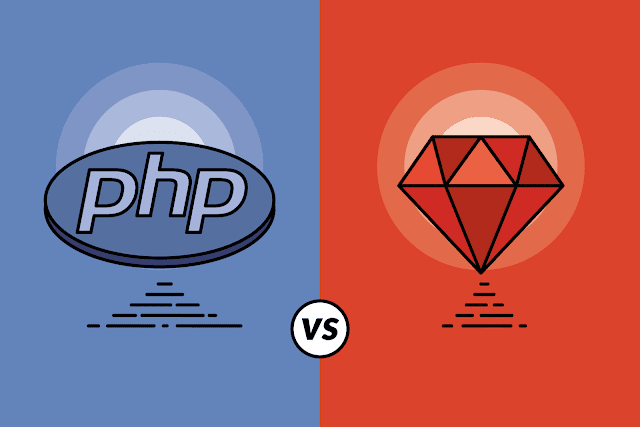Ruby on Rails vs PHP: Which One is Best and Secure?
First, let us try
to understand why you want to select a specific technology. All technologies
thrive off the tools, developer community, libraries and applications. As a
business owner, you might want a technology which can last for many years
beyond the inception of the project.
As a developer, you
want a technology which can be maintained long enough for you in order get a
good return on your investment. Business owners or developers will often make
their decisions considering their colleagues and the developer community,
depending on the technologies which is highly recommended.
In this post we
will a brief look at the pros and cons of PHP and Ruby on Rails. We will see
how PHP and Ruby on Rails can be compared with common points like maintenance, performance, scalability, costs
and support.
Comparison of PHP
with Ruby on Rails is not fair at all. PHP is much more popular than Ruby on
Rails, its because Ruby on Rails is a web development framework, not a
programming language. Ruby is the language running Ruby on Rails framework in
the backend, and PHP is the programming language used to code and create
websites and web applications.
Ruby on Rails
should be compared with Symfony2, Zend Framework, Codeigniter, Laravel, CakePHP
and many other PHP-based web development
frameworks. So, to understand why there is so much popularity among Ruby on
Rails, it is better to visualize searches made by people.
This trend graph from Google above shows that all PHP web development frameworks still do not add up to the number of searches made for Ruby on Rails (in blue). In fact, the only web framework that is growing in the PHP world is Laravel. So, why is Ruby on Rails so popular?
Well, a big part of creating a web application is deciding what libraries you want to use, how to organize your web application and many other factors. Till date, many PHP projects are still not using a mature and proven web application development framework. Many PHP developers would prefer to create a new PHP framework, instead of using the most popular frameworks such as Zend Framework, Symfony2, etc.
Due to the complexities of an application, as with any framework you will have to spend a lot of time learning to use that particular framework. Therefore, Ruby on Rails tries to simplify the learning process of their framework by rejecting configuration over conventions; In other words, you (the developer or owner of the business) have little time to decide when it comes to organizing, executing, or even hosting the application.
This might seem like a good thing, and for the most part, it really is, which is the reason why Ruby on Rails is very popular. However, since then, many PHP web application development frameworks have recognized it and are following the steps of Ruby on Rails web development. This could be the reason why the growth of the Ruby on Rails community has stagnated in recent years. Now, while the other web development frameworks are shown in small percentage, you should still keep in mind that PHP is completely web focused. So almost everything you write in PHP will run on the web, while in Ruby, there are not many options for you on what code you can write to develop a web application.
1. Scalability and Ease of Maintenance:
Whether PHP or Ruby on Rails, both provide the ability to scale. However, due to the amount of resources that Ruby uses compared to PHP, scalability issues will arise much earlier in the life cycle of your application. Scale an application in Ruby on Rails versus PHP will address very common problems. Therefore, the scale will be based on how the application was designed. There are also online services to help solve scaling problems such as using Rackspace Cloud Sites or Amazon Elastic Beanstalk.
The situation becomes very different when you go from wanting to climb to needing climbing. When a developer does not have the experience to scale an application, the most common route is to find online articles, tutorials and other resources to learn. So, when we are talking about scaling a website, there are many resources written and available for PHP developers, while Ruby on Rails has a much smaller group of developer community.
As for the easy maintenance, it totally depends on the organization of the web application. As long as the web developer is using a web development framework, then general maintenance is a lot easier. PHP offers a massive selection of web development frameworks, all designed for specific objectives, while Ruby has a limited selection (apart from Ruby on Rails).
2. Speed and Performance:
Since PHP is a programming language, and Ruby on Rails is a web app development framework, you should take the performance with a grain of salt. The goal of using a complete web development framework is to gain productivity at the cost of speed. So let's put some light on this.
Here is a table of a very simple web application of "hello world". Below you can see how fast PHP is when it comes to requests: remember, it is a language designed specifically for the web. However, once you start introducing popular full-stack web app development frameworks, performance decreases, and requests per second approach the Ruby on Rails number.
In fact, a famous PHP web development framework Laravel starts performing worse than Ruby on Rails. As a result, many benchmarks are useless, because there is much more to the speed and performance of a web application than the language or web development framework. For instance, the network delays, database system, and caching mechanisms, can add to a slowdown from 10x to 100x. So, how is the design of the application is much more important than the programming language or the web development framework behind it.
In general, Ruby and PHP are some of the slowest languages to choose from, but Ruby takes more resources than PHP. With the given performance problems, both languages have taken steps to help reduce the slowness that arise in everyday applications. Both languages have several execution times, their central execution times, such as MRI for Ruby and Zend Engine for PHP. Using those execution times is quite slow compared to other languages. There have been several attempts to solve these problems.
There has been work to execute both languages in the JVM, which is what Java uses as its execution time. The reason for running JVM is not only the speed, but also everything that Java has to offer. However, just because they run in JVM does not guarantee a faster application. There are things in the JVM that run slower. Therefore, if you need your application to run as fast as possible, there is also Rubinius for Ruby and HHVM for PHP, which are designed to run your applications faster, at the expense of limited platform support. For example, Rubinius and HHVM are not compatible with Windows. They are not compatible with everything offered by the core execution times, so you will have to change certain parts of your application to ensure that it can run in these high-performance execution times.
3. Cost:
Scarcity is a fundamental concept of the economy. So, if you have 10 PHP web developers for each Ruby web developer, and the function of the project depends on the language, there will be a clear winner in the costs. PHP, due to its strong competition, has lower prices. As a business owner, if your motive is based on costs, this should be a very useful incentive. There is the saying "You get what you pay for," but that does not mean you have to pay the same amount for the experience available. PHP has a very easy learning curve. In addition to that, many PHP developers are new to programming in general and to the programming of web applications in particular.
On the other hand, Ruby is a language more difficult to learn, so people who choose that language already know how to program. It is very natural for a PHP developer to move to Ruby on Rails, and his experience in the worldwide transfer of PHP to Ruby. In fact, many Ruby developers were PHP developers. So, why do developers jump to Ruby on Rails? Well, this answer would be the same for almost any other programming language other than PHP.
In any other language (except PHP), the language will limit it in the code you can write, as well as in what is available to use. Therefore, it becomes a common method to create web applications in that language. For example, C # has ASP.NET, Python has Django, Node.js has Express, Lua has Orbit, and the list goes on. Therefore, to put this in perspective, let's say you had the option to interact with a mass audience, or be among selected professionals who share the same objectives. It would make sense that the most recognized applications are built in the languages that have the largest audience, therefore, PHP is the target language. Applications like Wordpress, Drupal, Magento, Facebook, are just a small part of the many applications available, which are written in PHP.
When it comes to hosting your Ruby on Rails applications, costs can go up very quickly. You will find it more difficult to find a hosting that supports a Ruby on Rails application, and the big brands are not cheap. They start at $ 40 and quickly jump to $ 500 or more. There are even some companies that offer free accommodation, but they will charge a lot of fees when they need to expand their accommodation needs. Almost all hosting companies that offer Ruby on Rails hosting will also provide PHP hosting. Some of the cheapest hosting providers offer old and outdated versions of Ruby (the language), which limits you to previous versions of Ruby on Rails. They also run their Ruby on Rails application as CGI, which is the slowest way to run your web application.
4. Support and Resources
PHP has a very large group of developers and online resources. Ruby on Rails also offers many resources online, but there are many more resources available for PHP. However, many resources that you will find for both PHP and Ruby on Rails are often outdated or incorrect. This is the nature of trusting the Internet to obtain resources. There have been initiatives in both communities to create definitive guides. For example, PHP has phptherightway.com, which will help newcomers avoid common pitfalls, such as security, installation, multilingual coding practices, testing, etc. While Ruby has a large selection of podcasts and professional video content.
There are also websites like stackoverflow.com that provide more up-to-date resources. In stackoverflow.com, for each Ruby on Rails question, there are five PHP questions. The most voted question has 480 votes for Ruby on Rails, while the most voted question in PHP has 2660 votes. A strange aspect is that there seems to be many more questions about Ruby on Rails and then about Ruby's language. There are also strange revelations in Ruby on Rails, since it is more about movement than language or code.
In fact, its rarity has gained so much traction, that Ruby on Rails has special niche communities like railsgirls.com, which is a website designed to help women create online applications. They go all over the world encouraging women to get involved in technology. On the PHP side is also phpwoman.com, which has existed for over 7 years, but which does not have the viral traction that railsgirls.com produces. And that's what you have to remember, much of the Ruby on Rails fame comes from the community, starting with very dedicated individuals, has created something that has such a strong market value. It does not matter if it is slow or if there are solutions that are better, people see and want to be part of the community.
5. Time for Implementation:
Both of these programing languages have rapid web application development times, because they are an interpreted language. For Ruby on Rails, appeared the famous video "Create a blog in 15 minutes", which attracted many web developers of all languages. That video set the standard for what a web framework should do to quickly create applications.
Since then, subsequent videos have been produced in other languages and frames, such as creating a blog in 20 minutes with PHP CodeIgniter. Another thing that Ruby on Rails is known for is the scaffolding. Scaffolding is the process of generating code based on some known parameters. Scaffolding is a very powerful tool to help you bring your application to market. FuelPHP provides many similar functions provided by Ruby on Rails scaffolding.
6. Editors and Tools:
This is an area where PHP outperforms Ruby on Rails. PHP offers a wide variety of editors and tools. When it comes to benchmarking, profiling and debugging, PHP succeeds in having more options. It is incorrect to assume that there is something that Ruby on Rails can do, that PHP can not do. However, there are things that both go well, and both are not doing so well, or may not be achieved so easily.
Most of the concern about PHP limits is related to hosting costs. For example, to do certain things in PHP you need an extension, called pecl. Many shared hosts will have a handful of these installed, but you can not install your own. Therefore, if you want to install yours, you must rely on a virtual private server, a server in the cloud or a dedicated server, which are as expensive as the Ruby on Rails hosting, since you need the same requirements. Therefore, most PHP software that comes from the PHP community must rely on the features of the old language and on the paralyzed functionality, since they are designed to run in shared hosting environments.
7.I. TASKS OF BACKGROUND:
A task in the background is something that many applications will want to perform to preserve the user experience by providing a quick response time. These are certain things that can take a long time to complete. For example, if your user tried to delete a large amount of data, it is possible that the application executes it as a background task, and in this way the user does not need to wait for that action to complete. There are also different ways to run a task in the background. It has threads, which may or may not be a good idea, as it could block your entire application. There are also asynchronous tasks, which run but are delayed or can execute small parts of the operation at the same time. The other solutions include running a task in a different process, server or server groups.
For Ruby on Rails, it has Threads out of the box, but there are a lot of Gems (libraries) to consider that are designed to work with Ruby on Rails. Workling, Starling, Resque and many others will help you design your application so you can run a long process, say something like an email, calculation or even a scheduled task.
However, for PHP, the image is very different. There is an extension called pthread, but it is not designed for a type of "shoot and forget" task, such as an email. Instead, they force you to make some decisions, which you can also do in Ruby on Rails. The first thing is to design your application correctly so that it works together with a task management system. For example, Gearman is a language-independent framework for processing jobs. It connects to all languages and all the application has to do is communicate with it with a workload, such as an email.
Therefore, although background tasks can be really simple in Ruby on Rails, they generally lead to poor performance or applications that can not scale. The final solution that many developers choose is something like Gearman (which can also be used in Ruby on Rails). This only leads to the point of how easy it is to delay a complicated part of its application at a later stage, when it becomes a problem. The other option in PHP is to keep launching a request to the web server, and that request will verify that a task does. This is usually executed by a time-based task scheduler, such as cron, chronos, launchd, cronie, etc. The programmers of works based on time are those that are most used when it comes to PHP applications.
7.II. TEMPLATE ENGINES:
A template engine is a way to create and reuse user interfaces based on dynamic information driven data. There are more than 50 template engines in PHP, not including the fact that you can use PHP as a template engine. In addition to this, Ruby on rails only has several useful template engines. In the context of Ruby on Rails, there are merely 2 to 3 template engines that would work well with that framework.
Wrapping Up
Then, remember that there is a lot to consider when creating an application and if there really is something to be removed from this article, it is not that it is a poor solution, it is just that language is the least of your concerns. Here is a quick summary of the elements to which you can refer:
PHP
- Large group of developers
- Affordable solutions
- Broad knowledge
- Various selection of tools
- Easy to learn
RUBY ON RAILS
- Fast time to market
- Easier to find skilled workers
- Passionate community
- Always changing
For more details please refer: www.sp-assurance.com




Comments
Post a Comment